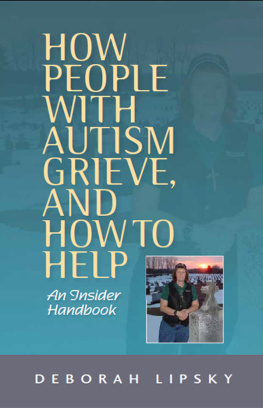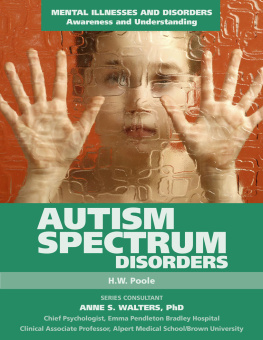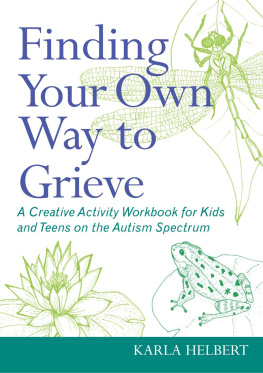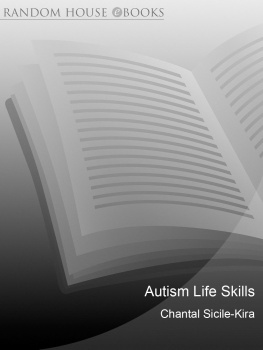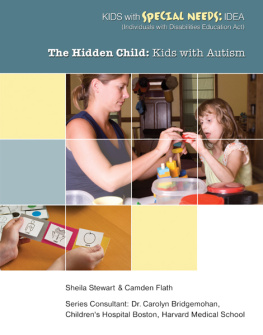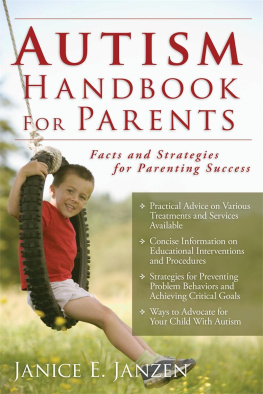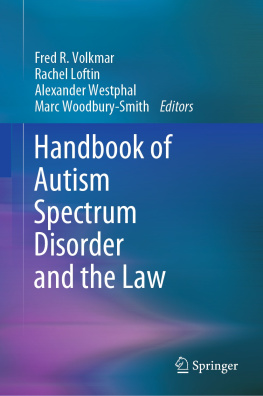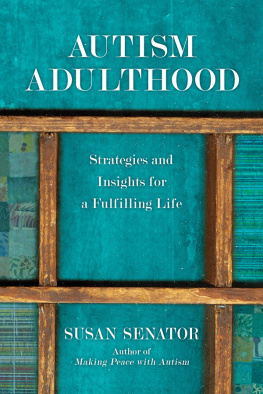by the same author
From Anxiety to Meltdown
How Individuals on the Autism Spectrum Deal with Anxiety, Experience Meltdowns, Manifest Tantrums, and How You Can Intervene Effectively
Deborah Lipsky
ISBN 978 1 84905 843 8
eISBN 978 0 85700 507 6
Managing Meltdowns
Using the S.C.A.R.E.D. Calming Technique with Children and Adults with Autism
Deborah Lipsky and Will Richards
ISBN 978 1 84310 908 2
eISBN 978 1 84642 917 0
of related interest
The Complete Guide to Aspergers Syndrome
Tony Attwood
ISBN 978 1 84310 495 7 (hardback)
ISBN 978 1 84310 669 2 (paperback)
eISBN 978 1 84642 559 2
Finding Your Own Way to Grieve
A Creative Activity Workbook for Kids and Teens on the Autism Spectrum
Karla Helbert
ISBN 978 1 84905 922 0
eISBN 978 0 85700 693 6
How People with Autism Grieve, and How to Help
AN INSIDER HANDBOOK
Deborah Lipsky

Jessica Kingsley Publishers
London and Philadelphia
First published in 2013
by Jessica Kingsley Publishers
116 Pentonville Road
London N1 9JB, UK
and
400 Market Street, Suite 400
Philadelphia, PA 19106, USA
www.jkp.com
Copyright Deborah Lipsky 2013
All rights reserved. No part of this publication may be reproduced in any material form (including photocopying or storing it in any medium by electronic means and whether or not transiently or incidentally to some other use of this publication) without the written permission of the copyright owner except in accordance with the provisions of the Copyright, Designs and Patents Act 1988 or under the terms of a licence issued by the Copyright Licensing Agency Ltd, Saffron House, 610 Kirby Street, London EC1N 8TS. Applications for the copyright owners written permission to reproduce any part of this publication should be addressed to the publisher.
Warning: The doing of an unauthorised act in relation to a copyright work may result in both a civil claim for damages and criminal prosecution.
Library of Congress Cataloging in Publication Data
Lipsky, Deborah.
How people with autism grieve, and how to help : an insider handbook / Deborah Lipsky.
pages cm
ISBN 978-1-84905-954-1 (alk. paper)
1. Autistic people--Psychology. 2. Autism--Psychological aspects. 3. Loss (Psychology) 4. Grief. I. Title.
RC553.A88L568 2013
616.85882--dc23
2013008474
British Library Cataloguing in Publication Data
A CIP catalogue record for this book is available from the British Library
ISBN 978 1 84905 954 1
eISBN 978 0 85700 789 6
Contents
INTRODUCTION
How This Book Came About
I decided to write a book on understanding grief and loss because the death of my closest friend in 2010 truly pointed out significant differences on how people with autism grieve compared to non-autistic people. The expectations of the non-autistic world revolving around death and dying collide with the autistic perceptions of death and dying. Autistic individuals like me tend to become solitary creatures when faced with overwhelming stressful situations. We seek refuge alone in our own safe little world of a special interest or pursuit. We fiercely hang on to our rituals and routines. This sharply conflicts with the non-autistic world seeking solidarity in sharing their painful situations and grief with others, especially surrounding death.
The ending of any meaningful relationship, whether it is from death, divorce, or geographical separation, creates a grief response. The most common question I get asked while conducting seminars on autism is, Do autistic people cry? There is this misperception out there that autistic individuals lack empathy and are disconnected from their emotions. This is only reinforced by the outward observance of some of our unconventional behaviors during such a stressful event. Nothing could be further from the truth. Our grieving process is different; not non-existent. We dont adhere to the universally accepted five stages of grief that western society has embraced. We do cry and we do feel the pain of loss. It is my hope that this book will help you understand how we grieve and tend to deal with any significant loss. I will provide you with strategies that will help you help us during such times. This is not a psychology textbook on human emotion. It is an honest firsthand account of how we autistics process the grief associated with the loss of someone in our life.
Discussing death and dying is such a morbid topic that its sheer unpleasantness tends to have us avoiding the subject until a loss occurs. My concern is for all of us autistic adults with aging parents who will have to face this stark reality some day. The death of my mother is unthinkable. The death of my husband, who is 18 years older than me, is a reality I am reluctant to face. There are autistic children deeply attached to an aging grandparent. Questions need to be answered. How will we handle such loss? How can you help us during such a time? Death brings about dramatic change and people with autism do not embrace change with open arms. How do you break the news that someone we are close to has died? Do you modify or completely change an autistic routine that involved the person who has died? What about our participation in the wake, funeral, or memorial service? Why are we behaving in such an inappropriate and selfish manner?
In 2010 my colleague, mentor, and dear friend Will Richards died from leukemia. We had been very close for the previous five years and my weekly visits with established routines were mutually anticipated and enjoyed by us both. His diagnosis came as a shock, and shortly thereafter our routine was suddenly and abruptly thrown into chaos as he underwent chemotherapy and lengthy hospital stays. My weekly time with him used to be a one on one relationship without other people to distract us. Being autistic I have difficulty relating to more than one person at a time unless I am the one in charge of the conversation, such as when I am the speaker at a presentation.
All of a sudden our afternoons together became isolated short visits based on daily conditions which were always in fluctuation. Unpredictability was the new norm and I had great difficulty trying to adhere to continuous change. Friends and family invaded the time I spent with him, turning our one on one relationship into group gatherings. I could not adapt to that because in my autistic way of thinking, I was friends with Will only, not all his relatives and well-wishers. I became increasingly frustrated by what I saw as an invasion into our time together and a total dismantling of the immoveable structure of a five-year routine. I had no interest listening to three or four way conversations about things other than what Will and I used to talk about. To complicate matters even more, as the room filled with other well-wishers, the sheer crowd caused my autistic mannerisms to become painfully obvious. Although most of his visitors knew I had autism, many of them were unprepared to see a 48-year-old woman displaying such behaviors as rocking and hand stimming which only intensified as my anxiety level kept creeping higher due to a constant stream of people entering and leaving his room.
No one wanted to talk about the inevitable fact that he could die. There was great hope in remissions and state of the art treatments. Conversations always focused on everything but the disease at hand. I remember sitting and listening to the conversations of others. Sports, the weather, or other such trivial matters were the dominant theme. Will used to always reassure me that he would beat this disease and not abandon me (I have some real abandonment issues that I am trying to overcome). Our routine would resume once he was better. I trusted him whole-heartedly. I know now he said those things out of love, trying to prevent unnecessary worry over a very uncertain future. At the time however, as he got sicker I became angry that he was lying to me about how things will get better some day. I needed the brutal truth and that was something no one wanted to address. I needed a script to deal with the aftermath of his death, but I found no template in the traditional books on grieving. I needed people not to judge me because of how I came to grips with his death, but there was no autistic book written on the subject that I could hand to them.

